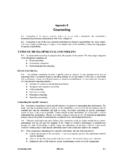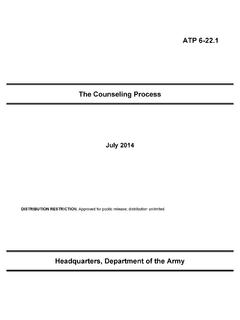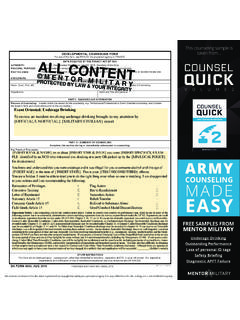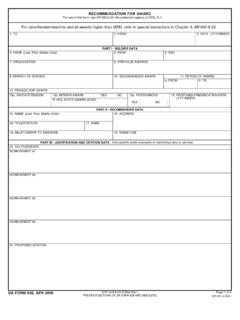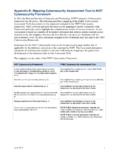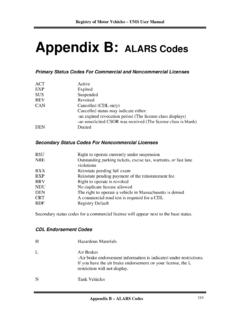Transcription of Appendix B Counseling
1 Appendix B. Counseling B-1. Counseling is the process used by leaders to review with a subordinate the subordinate's demonstrated performance and potential (Part Three, Chapter 8). B-2. Counseling is one of the most important leadership development responsibilities for Army leaders. The Army's future and the legacy of today's Army leaders rests on the shoulders of those they help prepare for greater responsibility. TYPES OF DEVELOPMENTAL Counseling . B-3. Developmental Counseling is categorized by the purpose of the session. The three major categories of developmental Counseling are . z Event Counseling . z Performance Counseling .
2 Z Professional growth Counseling . EVENT Counseling . B-4. Event-oriented Counseling involves a specific event or situation. It may precede events such as appearing before a promotion board or attending training. It can also follow events such as noteworthy duty performance, a problem with performance or mission accomplishment, or a personal issue. Examples of event-oriented Counseling include . z Instances of superior or substandard performance. z Reception and integration Counseling . z Crisis Counseling . z Referral Counseling . z Promotion Counseling . z Separation Counseling . Counseling for Specific Instances B-5. Sometimes Counseling is tied to specific instances of superior or substandard duty performance.
3 The leader uses the Counseling session to convey to the subordinate whether or not the performance met the standard and what the subordinate did right or wrong. Successful Counseling for specific performance occurs as close to the event as possible. Leaders should counsel subordinates for exceptional as well as substandard duty performance. The key is to strike a balance between the two. To maintain an appropriate balance, leaders keep track of Counseling for exceptional versus substandard performance. B-6. Although good leaders attempt to balance their Counseling emphasis, leaders should always counsel subordinates who do not meet the standard.
4 If the Soldier or civilian's performance is unsatisfactory because of a lack of knowledge or ability, leader and subordinate can develop a plan for improvement. Corrective training helps ensure that the subordinate knows and consistently achieves the standard. B-7. When Counseling a subordinate for a specific performance, take the following actions: z Explain the purpose of the Counseling what was expected, and how the subordinate failed to meet the standard. z Address the specific unacceptable behavior or action do not attack the person's character. z Explain the effect of the behavior, action, or performance on the rest of the organization.
5 12 October 2006 FM 6-22 B-1. Appendix B. z Actively listen to the subordinate's response. z Remain neutral. z Teach the subordinate how to meet the standard. z Be prepared to do some personal Counseling , since a failure to meet the standard may be related to or be the result of an unresolved personal problem. z Explain to the subordinate how an individual development plan will improve performance and identify specific responsibilities in implementing the plan. Continue to assess and follow up on the subordinate's progress. Adjust the plan as necessary. Reception and Integration Counseling B-8. Caring and empathic Army leaders should counsel all new team members when they join the organization.
6 Reception and integration Counseling serves two important purposes: z It identifies and helps alleviate any problems or concerns that new members may have, including any issues resulting from the new duty assignment. z It familiarizes new team members with the organizational standards and how they fit into the team. It clarifies roles and assignments and sends the message that the chain of command cares. B-9. Reception and integration Counseling should among others include the following discussion points: z Chain of command familiarization. z Organizational standards. z Security and safety issues. z Noncommissioned officer (NCO) support channel (who is in it and how it is used).
7 Z On- and off-duty conduct. z Personnel/personal affairs/initial and special clothing issue. z Organizational history, structure, and mission. z Soldier programs within the organization, such as Soldier of the Month/Quarter/Year, and educational and training opportunities. z Off limits and danger areas. z Functions and locations of support activities. z On- and off-post recreational, educational, cultural, and historical opportunities. z Foreign nation or host nation orientation. z Other areas the individual should be aware of as determined by the leader. Crisis Counseling B-10. Crisis Counseling includes getting a Soldier or employee through a period of shock after receiving negative news, such as the notification of the death of a loved one.
8 It focuses on the subordinate's immediate short-term needs. Leaders may assist the subordinate by listening and providing appropriate assistance. Assisting can also mean referring the subordinate to a support activity or coordinating for external agency support, such as obtaining emergency funding for a flight ticket or putting them in contact with a chaplain. Referral Counseling B-11. Referral Counseling helps subordinates work through a personal situation. It may or may not follow crisis Counseling . Referral Counseling aims at preventing a problem from becoming unmanageable if the empathic Army leader succeeds in identifying the problem in time and involves appropriate resources, such as Army Community Services, a chaplain, or an alcohol and drug counselor.
9 (Figure B-4 lists support activities.). B-2 FM 6-22 12 October 2006. Counseling Promotion Counseling B-12. Army leaders must conduct promotion Counseling for all specialists and sergeants who are eligible for advancement without waivers but not recommended for promotion to the next higher grade. Army regulations require that Soldiers within this category receive initial (event-oriented) Counseling when they attain full promotion eligibility and then periodic (performance/personal growth) Counseling thereafter. Adverse Separation Counseling B-13. Adverse separation Counseling may involve informing the Soldier of the administrative actions available to the commander in the event substandard performance continues and of the consequences associated with those administrative actions (see AR 635-200).
10 B-14. Developmental Counseling may not apply when an individual has engaged in serious acts of misconduct. In those situations, leaders should refer the matter to the commander and the servicing staff judge advocate. When rehabilitative efforts fail, Counseling with a view towards separation is required. It is an administrative prerequisite to many administrative discharges, while sending a final warning to the Soldier: improve performance or face discharge. In many situations, it is advisable to involve the chain of command as soon as it is determined that adverse separation Counseling might be required. A unit first sergeant or the commander should inform the Soldier of the notification requirements outlined in AR 635- 200.
